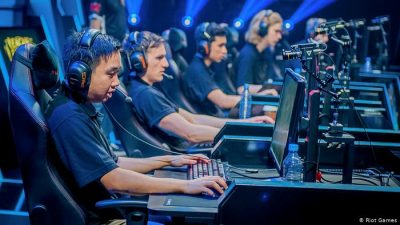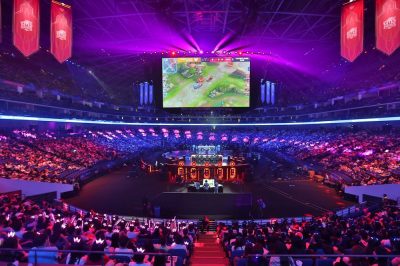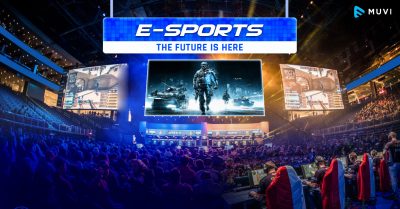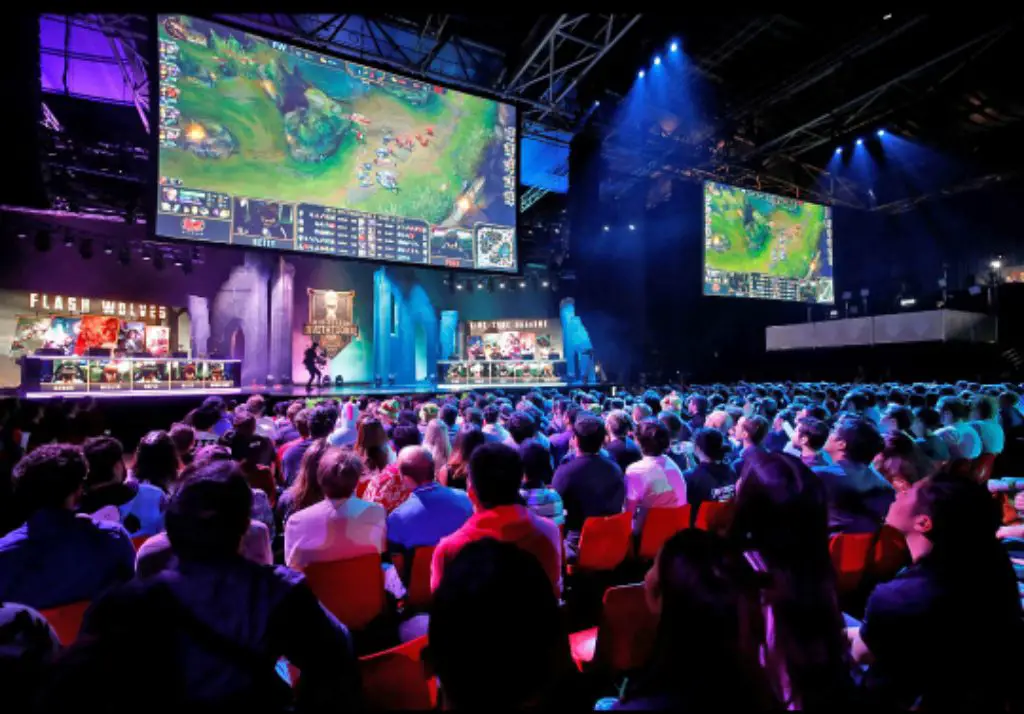By Felix Chiemeka Nwosu
Introduction
On October 19, 1972, the first ever video game tournament took place at the Stanford Artificial Intelligence Lab in California. The event was the brain child of a 33-year-old Steward Brand who was working on a feature story for Rolling stone on the potential of computers (through video games) to unleash creativity and change society. At the time he may not have envisaged that eSports tournaments would be racking an estimated viewership of over 350 million or that it would mark the start of a trend that would birth a billion-dollar industry.
Today, eSports is officially recognised as a sport in Asia and will be a part of the participatory options of the Asian Games in 2022. The United States, by categorizing eSports players as professional athletes has recognized eSports as a sport. A lot more countries are also beginning to recognize this emerging trend and taking steps to capitalize on it. In Nigeria, steps are being taken at the government level, albeit minimally and very recently, to capitalize on this emerging trend. The Nigerian eSports Federation is taking conscious steps to comply with the international requirements to secure affiliation with the league of eSports nations in Africa. More so, a few private-owned organizations in the country are taking up the responsibility of sourcing and creating a central database for Nigerian eSports enthusiasts as well as hosting and organizing eSports competitions in the state and even within other African countries.
The concept of eSports
eSports which is short for Electronic Sports is basically competitive video gaming at a professional level. Originally, what comes to mind when asked what video gaming entails, is that it is a leisure endeavour with friends and/or family, an exercise mostly associated with youngsters/teenagers, where the winner gets bragging rights within his small circle. In eSports, the reverse is the case with the video gaming competitions, the competitors have a much larger viewership who view either live in the centres, through streaming platforms online, or on TV and they play not just for bragging rights, but also to fulfil their contractual obligations and secure hefty cash prizes. It is almost akin to a full-time job.
Also Read: Legal and Commercial Implications of the NPFL New Television Broadcast Deal
eSports could take various forms which are largely dependent on the featured game. However, they majorly take the form of team-based games, played throughout a calendar year in the form of leagues or tournament to culminate in one final event. eSports has become such a global phenomenon in recent times that most stakeholders now set up outfits that are primarily tasked with sourcing and training exceptional gamers to join their gamers league. Most leagues offer regular salaries, side benefits and player rights when their players remain in the knockout competition and the benefits increase as the winning progresses. A popular example of an eSports team is that created by three-time NBA champion Rick Fox who created the eSports team Echo Fox. As regards world-renowned esports tournaments, the Fédération Internationale de Football Association (FIFA) has its own eSports world cup where the 32 best professional football console gamers battle for the title of FIFA E-World Cup Champion.

eSports players during a competition
Sponsorship, media rights, ticketing, brand advertising, investment and popularization puts Russia’s eSports market first in Europe with a market worth of about 38 million dollars, with Sweden in second place with 31 million dollars. North America is projected to generate $409 million dollars in 2019. In Asia, China is projecting $210.3 million dollars of revenue for 2019, India ranking 17 in the global eSports tally, boasts of a market worth of $800 million dollars. The total projected global eSports revenue for 2019 is put at $1.1 billion dollars.
As with any sport that attracts public attention and large revenue, there is bound to be a concomitant presence of legal constraints which both the players, investors and organizers face or may not avert their mind to, and as such should be mindful of.
Legal considerations;
A central law and regulatory body: The current regulatory landscape of eSports is uncertain. Countries are still trying to understand its reach as a sport in the traditional sense, to be able to better regulate it. The current practice is that event/league organisers make and implement event-specific rules (however, publishers are now getting increasingly involved) mainly on areas of cheating, betting and match manipulation to serve as guidance during the course of an event, which in the long run leaves room for inconsistency and cannot take the place of a central go-to regulation.
In the global scene, oversight groups have been created to help regulate the industry. The first among such organizations to spring up is the International ESports Federation (IESF) founded in the USA in 2008 to legitimize eSport. One of the criticisms of the IESF is the fact that its members comprise of national eSports federations which is not conducive as the most prominent eSport competitions are international, thereby making it hard for enforcement of their regulations at the international level. Another challenge faced by the IESF is the lack of seriousness attached by its members; “Of all of IESF’s member federations, the only two currently relevant federations are the Chinese and Korean ones, as their governments force teams to work with them (Chaloner, 2017). Few, if any, of the prominent eSports brands from other countries work with their national federations”.
In 2015, the eSports Integrity Coalition (ESIC) was established to regulate against antifraud by identifying and prosecuting players/organizers involved in match-fixing, in-game cheating, and e-doping. Another attempt to regulate the eSports industry and a rival of the IESF is the World Esports Association (WESA), which was established in 2016 by the world’s top-8 multi-gaming corporations. One of the aims of WESA is to be likened as the FIFA of eSports. However, efforts by the organization to secure their legitimacy have not been so successful due to lack of major achievements and an appearance that suggests that they lack enforcement powers and are just a tool for the eSports leagues. Other international associations such as the World eSports Council (WESC), Arab Esports Federation (AEF) for the Middle East, Asian Electronic Sports Federation (AESF) and Global E-sports Resources (GER) were also variously set up principally to develop and regulate eSports gaming activities. While all the above associations have similar oversight functions, their multiplicity may present a sense of confusion and lack of cohesion which hinders the unification objective. More still, most of these associations are not government-backed and as such lack, the legitimacy required to enforce their mandates. A step in the right direction could be to emulate traditional sporting organisations like FIFA, which has confederations in each region, working together under one collective document; the Rules of the Game.

The King Pro League tournament in Shanghai
In Nigeria for instance, where we have the Nigerian Esports Federation (NESF), the proper practice should be an affiliation with an African-wide eSports association (currently there is none) likened to how the Confederation of African Football (CAF) is to Africa, which would then be parented by a central organization, like FIFA. “The creation of this central regulatory body needs to be sophisticated and forge its own path because of the uniqueness of eSports and a broad range of legal and business issues”. Some of the current regulatory associations could be incorporated into this framework as a way to help with the current legitimacy and enforcement issues.
Competent legal representation: There is also a need for competent legal representation of eSports athletes. Legal issues surrounding eSports cover competition, labour/employment, corruption, intellectual property, tort, and contract laws. While these are not new areas of law, the legal approach is unique when it concerns the eSports industry and as such requires a certain level of legal specificity. Of special importance is the preparation of player contracts, a dilemma was raised as to the international nature of eSports wherein a team to participate in a tournament in France can comprise of Koreans, Malaysians, and Americans, in a North-American organization. Jurisdictional disputes are bound to arise from such a situation which is very important especially in the execution of contract claims. Looking also at the issue of capacity to contract, most eSports athletes/enthusiasts have a sizable chunk of its demographic under the age of 18. Nigerian law stipulates that a person under the age of 18 is a minor and as such does not have the capacity to enter into a contract, and even where such a contract is entered, it shall be void and thus enforceable. In such a situation do the existing rules in traditional laws apply? That is to say that players under 18 are not eligible to enter into professional contracts, if so, how will the rights of the larger demographic of players who fall under this age threshold be protected?
Also Read: The Professional Athlete as an Employee Within The Context of The NPFL Rules
Protection of Intellectual property (IP): In an industry such as this, most of the activities are technology-based. All the more reason why it is imperative to protect against the exploitation of intangible assets. Generally, the publishing companies are extremely powerful and control the IP rights over their games, however, these rights are often time delegated to broadcasters and/or game organizers.
IP protection generally in Nigeria has long been a challenging issue. There is an adjoining need for the principal IP regulatory bodies such as; Nigerian Copyright Commission (NCC), Nigerian Broadcasting Corporation (NBC), Trademark, Patent and Design Registry to recognize this emerging trend and capitalize by making accommodative provisions.
Conclusion
While the argument of whether or not eSports can be considered a sport in the real sense remains a live issue of debate, the recent popularity of eSports cannot be overemphasized. In 2018, the International Olympic Committee (IOC) in collaboration with the Global Association of International Sports Federation (GAISF) held the first-ever ‘eSports forum’ in France aimed at having a better understanding and building a platform to accommodate eSports in the Olympic movement. It is also estimated that the eSports industry would be competing with Europe’s major football leagues in the succeeding years.
The budding Nigerian eSports community is enjoined to tap into this fortune wheeling trend, to which there is no better way to occupy a poise position in the sector than to make it an attractive destination for potential stakeholders by inculcating best practices from foreign climes and a working self-regulatory framework to address the areas of labour and employment disputes, competition, intellectual property, licensing among other salient areas pertaining to the legal side of eSports. It is also important for lawyers in the country to begin to familiarise themselves with this unique digital eco-system and industry practices. A better understanding will come in handy when rendering client advice/opinion and negotiating contracts at all levels of the industry.

END NOTE
i. https://www.rollingstone.com/culture/culture-news/stewart-brand-recalls-first-spacewar-video-game-tournament-187669/
ii. The 2016 League of Legends World Championship finals, attracted 43 million viewers. https://www.weforum.org/agenda/2018/07/the-explosive-growth-of-esports/ ; accessed on November 17, 2019
iii. In 2018, the eSports industry is projected to generate $905 million in revenue, reaching over $1 billion over the next two years; https://www.weforum.org/agenda/2018/07/the-explosive-growth-of-esports/ accessed on November 17, 2019.
iv. https://www.forbes.com/sites/insertcoin/2013/07/14/the-u-s-now-recognizes-esports-players-as-professional-athletes/#6aacc17e3ac9 accessed November 25, 2019
v. https://sportfanzone.com/nigeria-e-sports-on-the-move/ ; accessed November 27, 2019
vi. https://esportsnigeria.org/teams/ ; set up by Alliance Gaming to bring esports enthusiasts together
vii. https://venturebeat.com/2016/10/13/african_gaming_league_esports_nigeria/ (Nov 27, 2019).
viii. https://venturebeat.com/2016/10/13/african_gaming_league_esports_nigeria/ (Nov 27, 2019).
ix. https://www.telegraph.co.uk/gaming/guides/esports-beginners-guide/ ; accessed on November 14, 2019
x. Echo Fox has teams for League of Legends, Counter-Strike: Global Offensive, and more.
xi. https://indianexpress.com/article/technology/gaming/will-indian-esports-industry-measure-up-to-the-chinese-5260259/
xii. Trent Murray, Newzoo Report Projects Global Esports Revenue to Reach $1.1B in 2019, THE ESPORTS OBSERVER, https://esportsobserver.com/newzoo-2019-report.
xiii. http://thesportdigest.com/2018/11/international-esports-federation-accepts-united-states-as-latest-member/; accessed November 25, 2019.
xiv. https://www.mcvuk.com/everything-you-need-to-know-about-the-esports-integrity-coalition/; accessed November 27, 2019
xv. https://medium.com/@heyimJoost/esports-governance-and-its-failures-9ac7b3ec37ea; November 27, 2019.
xvi. https://medium.com/@heyimJoost/esports-governance-and-its-failures-9ac7b3ec37ea; accessed November Nov. 26, 2019.
xvii.
https://repository.law.miami.edu/cgi/viewcontent.cgi?article=1329&context=umiclr; November 27, 2019
xviii. Section 18 of the Child Rights Act 2003
Copyright Notice
This work was written for and published on www.completesports.com. (unless otherwise stated) and the copyright is owned by the author. Permission to make digital or hard copies of this work (or part, or abstracts, of it) for personal use provided copies are not made or distributed for profit or commercial advantage, and provided that all copies bear this notice and full citation on the first page (which should include the URL, (Sportsbarng.com), article title, author name, date of the publication and date of use) of any copies made. Copyright for components of this work owned by parties other than the author must be honoured.
Felix Chiemeka Nwosu is an Associate in the law firm of Perchstone & Graeys LP, Lagos and works in the Dispute resolution and Sports law departments of the firm.
Copyright © 2024 Completesports.com All rights reserved. The information contained in Completesports.com may not be published, broadcast, rewritten, or redistributed without the prior written authority of Completesports.com.

COMMENTS